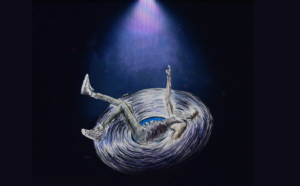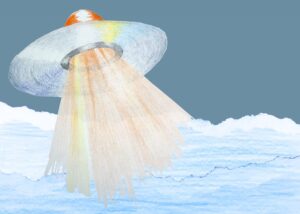Made popular by internet lore, liminal spaces have had their moment in the sun—or rather in the darkness, considering that these vast, enclosed spaces tend to let little light through. Though the Backrooms—a fictional, extradimensional expanse of empty rooms and one of the most well-known examples of the liminal space aesthetic—have warped into horror game levels brimming with entities and objectives, liminal spaces are transitional, transformative, and disconnected from reality.
This niche subset of internet culture has its own cult following, and served as the inspiration for mxmtoon’s third studio album, liminal space (2024). On an Instagram post from September, mxmtoon confirmed that the name and creative concept for her latest album came from her love of the Backrooms and her excitement for listeners to venture into this world with her. Invoking the aesthetics of liminal spaces promises a lot: immensity, endlessness, and escapism.
Although mxmtoon encapsulates the desperation of someone attempting to leave such an enclosure, liminal space leaves much to be desired in terms of its relation to the source material. There is no profundity, or even a significant transition from her previous work. While the lyrics hint at large changes in her life, this shift is not aided by her production. If anything, the dissonance between her sound and her story hinder the establishment of any solid narrative arc.
mxmtoon’s indie origin cemented her as a rising figure in the sphere of bedroom pop, gaining notoriety for her down-to-earth nature. In general, mxmtoon’s music is rooted in reality, characterized by emotionally transparent, confessional lyrics accompanied by her signature ukulele. While she slowly started to shed this image with newer releases and increased production, likely the result of signing to AWAL, she never strayed far from her roots, even pulling out acoustic renditions of her songs during live performances and maintaining her uncanny relatability. With liminal space, however, there is a disconnect between her brand and her music. mxmtoon seems to have traded her ukulele for a banjo—with limited success.
Straying from the indie-pop realm, mxmtoon experimented with country for the first time on this record, implementing quintessential country elements in “i hate texas,” “god?,” and “rain.” “i hate texas” is perhaps the most characteristic of mxmtoon’s venture into country, with a twangy banjo tune that runs through the entire track. While both catchy and quirky with fun, tongue-in-cheek mentions of shooter games and HGTV, there is something almost sterile to the song. The combination of deprecating lyrics, unnatural drawl, and a strikingly generic “Southern” sound all make the song too polished, almost to the point of sounding corporate. Hating on Texas but moving states to “go Southern” because “the exits have more room to run away” sounds too much like a coastal elite too big for their boots—their cowboy boots, that is.
Whereas “i hate texas” tries both too hard and too little, incorporating ill-fitting choices that sound unnatural and also airbrushed, “rain” opts for a more subtle country sound. This time around, signature Southern strings set the tone for a more contemplative environment, fading into the background as mxmtoon ponders where to go. Uncertainty is a common thread throughout liminal space, with “rain” exploring the push and pull of where home is: California or New York? Or perhaps even a secret third contender. Without the overproduction found in other songs, “rain” fits more neatly into mxmtoon’s discography, embodying the mindfulness she’s known for.
Vulnerability and playfulness are key tenets balanced throughout liminal space. Songs like “number one boy” and “now’s not the time” cut deep and bare insecurities set to simpler acoustic composition reminiscent of mxmtoon’s peak bedroom pop days. On the other hand, “the situation” finds joyful solace in reality, accepting that “there’s a final destination” where “we get older and then we die.” With an upbeat melody in the backdrop, “the situation” is an exemplar of optimistic nihilism brought to life with help from collaborator Kero Kero Bonito.
In the midst of impending dread, “VHS” also shares a lighter perspective on growing older. Contending with the reality of growing old (and watching others grow old), mxmtoon muses on this bittersweet feeling, supplemented by the soothing strum of a guitar and punctuated percussion not found in other, more subdued songs. As the post chorus fades out, warping the instrumental with it, the click of a VHS player ends the track, imbuing the song with nostalgia that feels appropriate. mxmtoon’s attention to the sonic composition of her work, providing subtle details to pack a punch, is where she thrives as an artist.
The same can be said for “just a little,” where rasp creeps into her voice throughout the chorus as she becomes more and more agitated that she will “try to scream, but it always sounds pretty.” And even still, she proves her own point, as this slight inflection does little to detract from her otherwise stable vocals.
In its entirety, liminal space is a solid album with standout tracks. But it’s a record that falls short of its namesake. Liminal spaces mark transitional periods, but mxmtoon seems to be playing it safe, refusing to commit the record fully to its country aspirations. Treating country as something to be borrowed, creates an uncomfortable, tired attempt that sounds out of place with the rest of the heavily indie leaning songs, which are the most well-developed. It may be unfair to compare mxmtoon to her younger self, especially as she lamented on always being the words she wrote when she was 17 on “victim of nostalgia” in rising (2022), but those words provided the platform she has now, and attempting to break free of them into liminal space is a misstep. A more concrete, fully fleshed out space would be better for the direction she’s headed, lest she end up in a place she may never be able to leave.
Voice’s Choices: “VHS,” “just a little,” and “now’s not the time”







